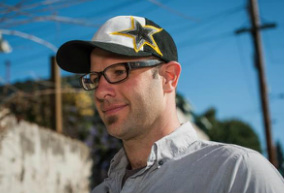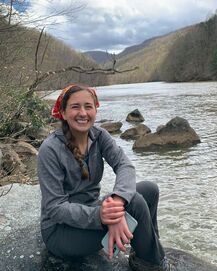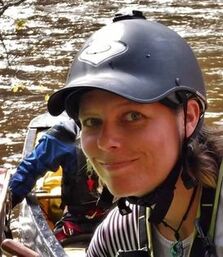Current Lab Members

Nicolas Zégre - PhD, is an avid river explorer, associate professor of forest hydrology, and director of the West Virginia University Mountain Hydrology Laboratory. Nicolas adamantly believes that the lines between his work life and play life should be fuzzy, and working as a research hydrologist and educator allows him to combine his passions of whitewater kayaking, surfing, exploration of seldom trodden environments, teaching, and sharing the love of water and environmental sciences. Since the water cycle is global, Nicolas is compelled to travel and follow water from high mountains and streams to the seas. For more information, see my CV here.

Grace Dever - Grace currently is working on a PhD Geography at WVU and leads GIS efforts of the WVU Center for Resilient Communities focusing on water justice is Master of Agriculture student focusing on water security and water justice throughout West Virginia. In addition to working in the MHL, Grace works in the WVU Center for Resilient Communities. He masters work focused on mapping water injustices related to safe drinking water, flood vulnerability, and water affordability across the state. Grace received a B.S. in Environmental Soil and Water Sciences and a Minor in German from WVU. In undergraduate, Grace competed on the WVU Women’s Varsity Rowing team. To be able to connect her research and passion is why she loves working in the Mountain Hydrology lab. Grace grew up in Lakewood, Ohio on Lake Erie. Grace's entire life has revolved around water from a young age spending most of her time outside, hiking, rowing on a river or lake, or running. Prior to joing the MHL, Grace participated in the Appalachian Food Justice Fellowship and was exposed to many different perspectives on how to address food insecurity. After the fellowship, she began working as an undergraduate research assistant in the CRC focusing primarily on mapping data that was gathered through our research. Also, check out the Story Map that Grace created on Water Insecurity in West Virginia.

Mel Shafer - Mel is a MS student focusing on analyzing streamflow and climate data as a way to combine her passions for whitewater paddling and promoting West Virginia as a whitewater state. Mel's research in collaboration with the WVU Brad and Alys Smith Outdoor Economic Development Collaborative will be used to develop a sustainable outdoor recreation economy and river conservation in West Virginia and beyond. Mel obtained her undergrad from East Stroudsburg University, focusing in organismal biology and environmental chemistry. After graduation, she took a job in the pharmaceutical industry out of necessity. After five years, she decided it was time to pursue her love of conservation, coupled with her passion for whitewater canoeing, and return to grad school.
Expat Mountainistas
Eric Sjöstedt - MS. Now at Northern Arizona University. Eric's work focused on hydrology, freshwater sustainability, geographical information science (GIS), and data informatics. He is particularly interested in environmental crime as a mechanism of injustice. Eric received his B.A in Geography with a Minor in Environmental Economics during his time as a student-athlete for WVU. Eric hails from a small city in Sweden called Ystad in Sweden. He became passionate about the environment since he first learned about the environmental issues faced across the world. His goal in life is to use his education to aid the global effort of water security and energy supply to improve the quality of life for all. As a member of the Mountain Hydrology Lab, his research focuses on analyzing water use, water systems, and upstream-downstream dependence to explore water insecurity and environmental justice across the Appalachian region.
Luis Andrés Guillén - PhD.. Now at Southern Swedish Forest Research Centre, Swedish University of Agricultural Science, Alnarp, Sweden.
Luis Andres studied ecohydrological processes in the Central Appalachian Mtns, focusing on rainfalll partitioning, tree-scale transpiration, and low-cost sensors for community monitoring. Luis Andres has a background in forestry, holding a MS degree on Forest Management from the Swedish University for Agricultural Sciences. Guillén started his career in Venezuela (VE) where he obtained a Forest Engineering degree with a major in Watershed Management from the Universidad de Los Andes. He has been involved with environmental and recreational NGOs in Sweden and has worked for the National Office for Biodiversity (VE), as well as the National Park Service (VE). His most recent research experience looked at the social-natural nexus within small scale forestry; there he focused on the social capital non-industrial private forest owners and their relationships with different institutions. More information can be found here.
Luis Andres studied ecohydrological processes in the Central Appalachian Mtns, focusing on rainfalll partitioning, tree-scale transpiration, and low-cost sensors for community monitoring. Luis Andres has a background in forestry, holding a MS degree on Forest Management from the Swedish University for Agricultural Sciences. Guillén started his career in Venezuela (VE) where he obtained a Forest Engineering degree with a major in Watershed Management from the Universidad de Los Andes. He has been involved with environmental and recreational NGOs in Sweden and has worked for the National Office for Biodiversity (VE), as well as the National Park Service (VE). His most recent research experience looked at the social-natural nexus within small scale forestry; there he focused on the social capital non-industrial private forest owners and their relationships with different institutions. More information can be found here.
Justin Earle MS, focused on hydrology and freshwater resources management. Justin obtained a BS in Wildlife and Fisheries Management degree from West Virginia University and plans on merging his interest of fly flishing, fisheries, and Appalachian streams for his graduate research. Justin is a native West Virginian, hailing from Wardensville, a small town in Hardy County in the eastern panhandle. It was there that his love for the outdoors began. Justin returned to West Virginia after serving the United States Army with the goal of making West Virginia and the world a better place. As a member of the Mountain Hydrology Lab, Justin will examine freshwater sustainability across the state, with a specific emphasis on climate change impacts on freshwater ecosystems.
Matt Kearns - Hydrologist USGS. MS, Matt focused on hydrology and resource management. He obtained his undergraduate degree in Environmental Science from the US Coast Guard Academy. Family and the Monongahela National Forest enticed Matt back home to West Virginia after five years on active duty. A deep love for the Mountain State, a thirst for clean water, and an "all of the above" approach to outdoor recreation fuels his career as an advocate for public lands with the West Virginia Rivers Coalition. In 2016, Matt traveled the entire 180 miles of the Elk River watershed to connect Charleston's drinking water to its origins in the National Forest. As part of WVU's Mountain Hydrology Laboratory, Matt is researching the value of surface water produced in the Appalachian Mountains in order to promote novel approaches to conservation and a sustainable economy.
Rodrigo Fernandez – Post Doc, originally from Guatemala, is a postdoctoral research associate and climate scientist evaluating the changes in the hydrological cycle due to climate change in the Appalachian region. Rodrigo is responsible of generating high resolution climatological and hydrological datasets for their use in multidisciplinary modelling applications. Rodrigo’s research interests also include the variability of spatial and temporal sensitivities of water and energy balances at regional to global scales. He is motivated to unveil the possibilities of change in fresh water resources aiming to provide key information to achieve sustainable water management practices. He earned his Civil Engineering Degree in Universidad del Valle, Guatemala City; and his MSc and PhD at the UNESCO International Centre for Water Hazard and Risk Management in Tsukuba, Japan. He also enjoys swimming, cycling, running, yoga and other activities outdoors.
Brandi Gaertner - PhD student, Assistant Professor Alderson Broaddus University. Brandi studied the effect of climate change on Mid-Atlantic surface water resources. Gaertner has a background in Biology, completing her M.S. in environmental biology at Clarion University of Pennsylvania and her B.S. in Biology at Indiana University of Pennsylvania. Her master’s research focused on the effect of large woody debris additions on stream morphology and brook trout habitat in the Allegheny National Forest in Pennsylvania. Before joining the Watershed Hydrology Laboratory, Brandi worked as a wildlife biologist at the United States Forest Service, where she monitored invasive and endangered species and implemented stream restoration projects. In her free time, she plays roller derby on a Pittsburgh league known as Steel City Roller Derby (SCRD), and has been for several years. She also enjoys traveling, backpacking, motorcycle trips, trail riding, and reading (favorite pastime).
Leighia Eggett was a Peace Corps Master's International MS student evaluating the impacts of climate change on the upper Blackwater River Watershed near Davis, West Virginia. Specifically, Leighia's research is focused on evaluating the the importance of headwater wetlands on downstream resilience of the Blackwater River Watershed in a changing climate based on a comparison of available hydrometric data of Canaan Valley and the upper Blackwater River to future climate projections of the watershed area. Leighia is a teaching assistant for the Dept. of Biology, teaching several entry level labs. She earned her B.S. in Environmental Science from Brevard College in Brevard, North Carolina, where she has researched impacts of riparian buffers along headwater trout streams in North Carolina and the carbon budgets of reclaimed surface mines in the Southern Appalachian coal region of eastern Kentucky.
Arati Umarvadia MS research evaluated the hydrogeochemistry of rural drinking water in the Gauley River Basin, Monongahela National Forest. Before attending WVU, Arati earned a B.S. in Geoscience from Virginia Tech in 2010. Subsequently, she worked for three years at state-regulatory agencies in PA and WV where she investigated stream de-watering from long-wall mining, and conducted geospatial analysis of abandoned mine lands. Her professional interests include groundwater investigations, site remediation, water quality assessment, and global water availability, sanitation and hygiene (WASH). In her spare time, Arati enjoys rock climbing, yoga, road biking and cooking.
David Young After completing his MS degree, David work with the environmental consulting firm, Green Rivers, focusing on stream and watershed restoration, then served as science coordinator for the Friends of the Backwater watershed organization. In fall 2017, David move back to Texas and is working as a hydrologist for the Texas Department of Conservation. Daivd's MS research focused on quantifying the impacts of climate change and land cover disturbance on forested head water catchments of the US Forest Service's Fernow Experimental Forest
Carson Wright works as a hydrologist for the US Geological Survey out of Charleston, WV. Carson's graduate work focused on evaluating the impacts of climate change on West Virginia water resources. Specifically Carson’s research was focused on detecting systematic changes climate and streamflow variables using spatial and temporal-based change detection to characterize the magnitude and variable of change to ultimately understand the future of the state’s water resources.
Patrick Eisenhauer successfully defended his thesis in April 2013 and is currently working as an Environmental Scientist for Pennsylvania Power & Light. For his M.S. graduate research, Patrick collaborated with the US Forest Service Fernow Experimental Fores focusing on Marcellus shale development and water related issues. Specifically Patrick’s research focused on the use of water chemistry parameters and stable isotopes to characterize groundwater chemistry prior to drilling for Marcellus shale in the Monongahela National Forest, WV. Patrick ability to communicate his science earned third place in the poster competition at the 2013 West Virginia Water Resources Conference held in Morgantown, WV. Patrick’s research interests include the influence of landscape disturbances on forested watersheds and processes, the use of stable isotopes for hydrologic change detection, and groundwater modeling. He earned a B.S in Wood Science and Technology with an emphasis in forest utilization and a Minor in Forest Resource Management, from West Virginia University in 2011. Patrick’s passion for hydrology stem from his formative education and passion for whitewater kayaking.
Andrew Miller successfully his MS graduate research in April 2013. Andrew is a hydrologist for King County for the city of Seattle, Washington. Andrew’s graduate research explored the hydrologic impacts of mountaintop mining in the coalfields of West Virginia. His research focuses on impacts on streamflow generation processes and response time in headwater catchments of the Coal River through the use of stable isotope hydrology. Andrew’s research interests include the hydrologic impacts of landuse change and disturbance, headwater streamflow generation processes, and restoration ecology. Before joining the Watershed Hydrology Laboratory, Andrew served as a Watershed Coordinator at Friends of the Cheat (FOC), a nonprofit watershed organization working to restore the beautiful but mine scarred Cheat River Watershed. While at FOC, Andrew led several reforestation and stream bank stabilization projects and developed a volunteer stream sampling program to monitor the impact of a burgeoning shale gas drilling industry in the watershed. Andrew received a BS in Landscape Architecture from West Virginia University in 2007. When not in the field or in the lab, Andrew enjoys fly-fishing for native trout, backpacking, drawing, and swimming after his kayak on the rivers of West Virginia
